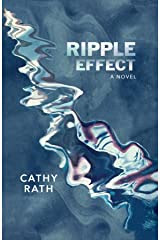From Marin Magazine Oct 2021 article:
A new book by Cathy Rath uses the turbulent 1960 and 70s as a lens to tackle difficult social justice issues — and tell a great story.
From San Francisco Book Review
It is 1968 and Jeannie Glazer, a college student, becomes involved with a radical group intent not just on peaceful protest but also on bringing about changes by whatever means necessary. When Jeannie is arrested during a protest in Chicago, she hopes her boyfriend and fellow protester will get her out of jail. Yet, when she’s bailed out, she is given an envelope with $200 in it and a bus ticket home to New York. The police officer tells her that it came from her father. But she knows that can’t be because he’s been dead for years. And just when she’s too deep inside the radical movement to leave, she meets a young man who helps her escape. Could he be an FBI informant, or is someone watching out for her? Rattled by these questions, she decides she must find out what happened to her father. Her discoveries could expose secrets that affect her whole family.
ABOUT CATHY RATH
Writing has been both a career and personal passion. I completed my education at UC Santa Barbara and San Francisco State University where I am a professor. My research in health and social justice was published by the American Public Health Association. As a director of a county-wide violence prevention project, my achievements were published by the National Resource Center on Domestic Violence, which contributed to my receiving the Marin County Millennium Leadership Award on behalf of women and girls. I am also a writing coach who guides debut writers in completing their books. During the turbulent 1970s, I was involved in a variety of protest movements, and "Ripple Effect" draws upon those profound experiences. This is my first novel.
ABOUT THE BOOK
Jeannie Glazer was three years old in 1952 when her father dies in a car accident on a trip to Atlanta. Sixteen years later, as a college freshman, she is arrested during the 1968 Democratic Convention in Chicago. She is released hours later when a sergeant announces that her bail was paid by "her pop" and tosses her an envelope of cash. Stunned and suspicious, Jeannie tells no one, convinced someone is watching her. Determined to find answers, her search closes in on a darker secret about her father's tragic death two decades earlier.





